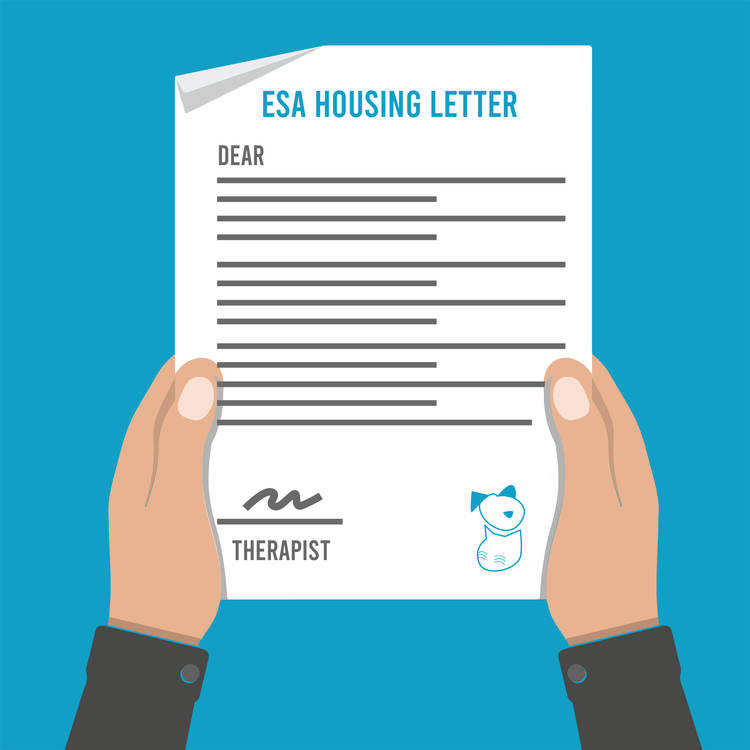If your landlord is giving you pushback about your emotional support animal, the first thing to do is make sure they’re not just giving you the runaround. Despite clear Fair Housing protections, housing providers will sometimes come up with creative excuses to avoid allowing your ESA. They might claim they need special certifications, demand to know your diagnosis, or simply give you the silent treatment.
Don’t fall for these tactics! This guide will arm you with the facts about your rights when a landlord, HOA, or condo board tries to deny your legitimate ESA request with one of these common excuses.
Need a rock-solid ESA letter that your landlord will have a hard time refusing? One of the licensed healthcare professionals we work with can get you a HUD-compliant ESA letter that you can confidently show your landlord.
Below are 7 common ways we have seen landlords wrongly deny an ESA housing accommodation
- “I’ll get back to you on that…”
- “Your animal needs to be certified or registered first.”
- “Fill out these additional forms and get them notarized.”
- “Tell us exactly what your diagnosis is.”
- “Your dog is too big/that breed isn’t allowed here.”
- “Only doctors can write ESA letters.”
- “We only accept ESA letters from local providers.”

1. “I’ll get back to you on that…” (The Silent Treatment)
What they say: “I need time to review this request.” Followed by weeks of silence.
The truth: Housing providers must respond to your ESA accommodation request promptly. According to HUD guidelines, landlords should respond within 10 days of receiving your documentation. When they ignore you or drag their feet, they’re violating fair housing rules.
If your landlord hasn’t responded within 10 days, follow up in writing. Document all communication attempts. Their silent treatment tactic doesn’t make your rights disappear.
2. “Your animal needs to be certified or registered first.”
What they say: “We need to see your ESA’s official certification, registration ID, or special vest.”
The truth: There’s no such thing as official ESA certification, registration, or ID requirements! These are completely unnecessary and have no legal standing under Fair Housing laws.
The only documentation you need is a legitimate ESA letter from a licensed healthcare professional. There’s no need for additional “registrations” or “certifications” online. Your landlord can’t make you purchase these things to prove you have an emotional support animal.
3. “Fill out these additional forms and get them notarized.”
What they say: “Your ESA letter isn’t enough. We need you and your therapist to complete our special forms.”
The truth: Housing providers cannot legally require:
- Your healthcare provider to use specific forms
- Notarized statements
- Declarations under penalty of perjury
HUD specifically prohibited these additional requirements for good reason. These rules were created after recognizing that some housing providers were deliberately making the accommodation process needlessly complicated and burdensome for people with disabilities.
When landlords demand special forms, notarized documents, or statements under penalty of perjury, they’re often:
- Creating unnecessary barriers and paperwork hurdles
- Intimidating tenants and their healthcare providers
- Discouraging legitimate ESA requests through bureaucratic tactics
- Delaying the accommodation process
- Attempting to access more personal medical information than they’re entitled to
- Imposing financial burdens (extra therapist time costs money)
- Hoping you’ll simply give up rather than jump through all these hoops
HUD recognized that licensed healthcare professionals already operate under professional, ethical standards and licensing requirements. When they provide an ESA letter, they’re putting their professional reputation and license on the line.
A legitimate ESA letter from a licensed healthcare professional is all you need. The letter already contains their licensing information and signature, which can be verified if necessary. Don’t let a landlord convince you otherwise or make you feel like your documentation is insufficient when it meets all legal requirements.
4. “Tell us exactly what your diagnosis is.”
What they say: “We need to know your specific medical condition to approve this request.”
The truth: Your medical privacy is protected by law. Landlords absolutely cannot demand:
- Your specific diagnosis
- Detailed information about your condition
- Access to your medical records
- That you undergo a medical examination
This protection exists for good reason. Your medical information is deeply personal, and disclosing your diagnosis could potentially lead to discrimination or bias, whether conscious or unconscious. Housing providers aren’t healthcare professionals and aren’t qualified to evaluate the validity of your condition or determine whether an ESA would help.
Moreover, forcing someone to disclose private health information creates an unfair power dynamic. People with invisible disabilities often face skepticism and judgment, which is exactly why these privacy protections exist in the first place.
If a landlord pressures you to reveal your diagnosis, firmly but politely remind them that:
- Fair Housing laws protect your medical privacy
- Your ESA letter contains all legally required information
- HUD guidelines specifically state that housing providers cannot demand diagnosis details
- You’re happy to discuss reasonable accommodations for your ESA, but your specific diagnosis is confidential
Your ESA letter should state that you have a condition that substantially limits a major life activity and that your ESA helps alleviate symptoms. That’s sufficient information; you don’t need to disclose anything more personal. Stand firm on this boundary — you have ESA laws on your side.
5. “Your dog is too big/that breed isn’t allowed here.”
What they say: “We allow ESAs, but not ones over 25 pounds/not pit bulls/not that breed.”
The truth: ESAs are not subject to pet policies, including breed and weight restrictions. Housing providers cannot impose these limitations on actual emotional support animals.
This is one of the most common misconceptions about ESAs. Many landlords mistakenly believe they can apply their standard pet policies to emotional support animals. They can’t. The whole point of ESA accommodation is that these animals are not classified as pets under Fair Housing laws.
Breed and weight restrictions are particularly problematic because they’re often based on stereotypes rather than an individual animal’s behavior. HUD has explicitly stated that housing providers cannot enforce breed, size, or weight restrictions for emotional support animals.
If your landlord tries to deny your ESA based on breed or size:
- Remind them that Fair Housing laws supersede standard pet policies
- Point out that HUD guidelines specifically prohibit blanket breed and weight restrictions for ESAs
- Offer information about your specific animal’s temperament and behavior
- Provide training certificates or references if you have them (though these aren’t required)
While landlords can evaluate whether a specific animal poses a direct threat to health or safety, they cannot make assumptions based solely on breed, size, or species. Any determination about an animal being a “direct threat” must:
- Be based on the specific animal’s actual conduct
- Be supported by objective evidence
- Not be based on stereotypes or generalizations
- Consider whether the threat can be reduced by another reasonable accommodation
Remember: your emotional connection with your specific animal is important. The law recognizes this by protecting your right to have your actual support animal, not just any animal the landlord deems acceptable.
6. “Only doctors can write ESA letters.”
What they say: “This letter isn’t from a physician, so it doesn’t count.”
The truth: ESA letters can come from a variety of licensed mental health professionals, including:
- Psychiatrists
- Psychologists
- Licensed professional counselors
- Clinical social workers
- Nurses
- Marriage and Family Therapist
- Physicians
When landlords insist that only physicians can write ESA letters, they create an unnecessary barrier that has no basis in Fair Housing laws. Most people receive mental health care from non-physician providers. Therapists, counselors, and social workers often have the most comprehensive understanding of a person’s mental health needs because they typically spend more time with patients than physicians do. In fact, most ESA letters are from non-physicians!
If your landlord questions the validity of your non-physician ESA letter:
- Point out that HUD guidelines specifically state that various mental health professionals can provide documentation
- Highlight your provider’s credentials and state license number (which should be on the letter)
- Offer to provide contact information for your provider if verification is needed
- Remind them that the law recognizes a range of qualified professionals
Any licensed mental health professional familiar with your condition can write a valid ESA letter. It absolutely does not have to come from a medical doctor. Don’t let a landlord’s misunderstanding of the law prevent you from obtaining the accommodation you need.
7. “We only accept ESA letters from local providers.”
What they say: “This online therapist doesn’t count. You need to see someone local.”
The truth: Fair Housing laws recognize telehealth and remote online services as legitimate. HUD has specifically acknowledged that licensed professionals can provide services remotely.
This issue has become increasingly important in recent years as telehealth has expanded. HUD has clearly addressed this in their guidance, recognizing that mental health services are evolving and that many people receive legitimate care through virtual platforms.
There are many valid reasons why someone might use telehealth services:
- Living in an area with limited mental health resources
- Mobility issues or disabilities that make travel difficult
- Work schedules that make traditional office visits challenging
- Childcare responsibilities that complicate in-person appointments
- Pandemic-related safety concerns
- Financial constraints (telehealth is often more affordable)
- The comfort and privacy of receiving care in one’s own home
- Mental health conditions that make leaving home difficult (like severe anxiety or agoraphobia)
Requiring in-person care creates an unfair barrier that disproportionately affects vulnerable populations—precisely the people Fair Housing laws aim to protect.
When landlords insist on local providers, they’re often trying to make the process more difficult or are suspicious of telehealth in general. But the reality is that telehealth mental health services have become mainstream.
If your landlord questions your telehealth-provided ESA letter:
- Reference HUD’s specific guidance accepting telehealth services
- Highlight that the provider is licensed in your state (this is the important part)
- Point out that the evaluation meets all the same professional standards as in-person care
The key requirement is that the professional is licensed in your state and is familiar with your personal situation and mental health.

Stand Up For Your Rights: Your Action Plan
Remember, the Fair Housing Act is on your side. Landlords who try to deny legitimate ESA accommodations with these excuses are not only being difficult but may be breaking federal law.
When facing resistance, follow these steps:
- Respond in writing
Keep all communication documented. If your landlord makes verbal excuses, follow up with an email summarizing the conversation: “As we discussed today, you mentioned that…” - Educate respectfully
Many landlords simply don’t understand the law. Share information from HUD’s guidance calmly and professionally. - Be solution-oriented
Offer to discuss any legitimate concerns your landlord might have about your specific animal. The law encourages an “interactive process.” - Set clear boundaries
Politely but firmly decline requests for information you’re not legally required to provide. - Give them a deadline
“I look forward to your response by [date]” can help move the process along. - Escalate appropriately
If your landlord continues to deny your request without a valid reason, consider these options:- Contact your local fair housing agency for free assistance
- File a complaint with HUD (can be done online)
- Consult with a tenant rights attorney (many offer free consultations)
- Reach out to disability rights organizations for advocacy support
- Take care of yourself
Dealing with housing discrimination is stressful, especially when you’re already managing a mental health condition. Lean on your support network, including your ESA.
Your need for an emotional support animal is valid. Your right to reasonable accommodation is protected by law. Don’t let intimidation tactics or misinformation stand between you and your ESA.
Armed with knowledge about your rights and common landlord excuses, you’re now better prepared to advocate for yourself. Remember, thousands of people successfully navigate this process every year — you can too!
Qualify for an ESA Letter Today!
Get the Love and Support you deserve!






I am moving and needing to find a new apartment. I reached out to a landlord asking if their place was still available to rent, and they responded with yes. I then informed them I am interested in renting the apartment but the ad said no pets so I was upfront and let them know I have an ESA. Now they are ignoring my response and haven’t answered. What can I do? Is there a nice way to send them another message saying they can’t discriminate against me?
Unfortunately in these situations it can be difficult to prove the landlord was discriminating against a tenant due to their ESA. They can blame their non-communication on a number of issues. If you feel you are being discriminated against because of your ESA however, you should inform the landlord of your concerns and put them on alert that you are aware of your Fair Housing rights as a tenant who requires an assistance animal.
I’m applying for a two bedroom apartment. I have two ESA dogs and my future roomate has one ESA dog. Can they deny us since the apartment complex has a max. 2 pets/ apartment?
Please see this article for more information: https://esadoctors.com/how-many-emotional-support-animals-can-you-have/
Can nurses fill out ESA letters?
Nurses are licensed healthcare professionals capable of writing ESA letters.
I’ve been waiting on getting my second ESA for over a month because the main person who has to approve it was out of the office for a week and now they are saying they faxed an additional form to my doctor and my doctor said they never received it so I let my landlord know and they said they sent it again and my doctor said they still have not received anything. What do I do? I’ve also asked if they could just send the form to me and then I can fax it over to my doctor and then have them fax it back, but they never responded on that.
You should be aware that under HUD guidelines landlords can’t ask for additional forms if you have already submitted a valid ESA letter. You might find this article helpful: https://esadoctors.com/hud-housing-rules-emotional-support-animals/
I purchased a condo in Destin Florida with a strict no pet policy imposed by the HOA. My daughter has two ESAs, current letter stating the need for BOTH from her long term licensed mental health professional, and proof of vaccinations. The HOA is requesting a license for the ESAs from the Vet. I have explained there is no such thing and they are refusing acceptance. We own the condo. What are my next steps?
Sorry to hear about your troubles. We suggest having a discussion with your HOA and showing them the relevant HUD rules. They clearly state you do not need a license for an emotional support animal.
What do I do if my landlord has approved my ESA, but the HOA has denied it and threatened eviction. Should I contact an attorney? Or file a complaint with HUD?
We recommend having a conversation first with your HOA to see if there’s a reasonable compromise (HUD guidelines actually encourage this as well). If there’s still an impasse you can consider legal options as well as filing a complaint with HUD.
Can you bring your ESA on the property before the landlord approves your accommodation request?
They initially denied the request, but after much persuasion on my end, they are finally reaching out to their lawyer to see if they have to comply with the fair housing act.
I only have about two weeks left at my existing rental & will need to bring my ESA to the new unit before then. The new lease has already been signed, rent & deposit has already been paid as well.
Technically the landlord must approve the ESA before it moves in. However, landlords have to respond to ESA accommodation requests promptly (within 10 days) and only have limited exceptions for denying an ESA accommodation.
I recently got an ESA letter online through a licensed therapist in my state. My landlord and management is declining it due to the fact it is from online. But yet I have a diagnosis from the therapist as well as from my regular PCP but since so many people have ruined it for others, my PCP cannot legally give me a note unless otherwise. Can my apartment management still decline this from me? It doesnt state in HUD that I need a local provider or multiple appointments, but my management is saying I do.
You are allowed to obtain letters through online therapists: https://esadoctors.com/can-get-emotional-support-animal-certification-online/
Our potential apt complex has denied our ESA letter on the grounds that it was issued 4 years ago and needs to be current. Is that a legitimate denial?
It’s probably reasonable for a landlord to request a more recent ESA letter in this instance.
I live on a college campus and have my official esa letter from my doctor. I’m working with the housing committee to get approved but they denied it because they dont know if its effective for my anxiety. They told me to have it live somewhere off campus, is this a valid reason?
Unfortunately colleges can often be a bit more difficult in terms of the approval process for ESAs. You can try challenging their decision and site to relevant HUD rules.
What are the determinations of what animal is a “safety risk” to the property and what is not?
There is no precise definition for what constitutes a safety risk, but the exact language from HUD’s guidelines is as follows: “The FHA does not require a dwelling to be made available to an individual whose tenancy would constitute a direct threat to the health or safety of other individuals or whose tenancy would result in substantial physical damage to the property of others.”